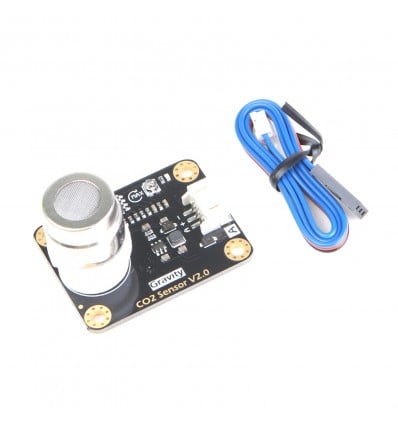International shipping Secure payment
No products
Prices are tax included
Product successfully added to your shopping cart
There are 0 items in your cart. There is 1 item in your cart.
This MG811 Analog Carbon Dioxide Sensor offers 350 to 10,000ppm sensitivity, to help you maintain a healthy, breathable living environment.
1 Item
Warning: Last items in stock!
Free shipping on orders over R1250 - courier delivery and within South Africa
As the popularity of various technologies grow, and our society continues to pollute the environment as we try to find more sustainable ways of living, it’s becoming increasingly important for us all to strive for healthy living environments. However, while it’s easy to see when there is pollution on the roadside or along the banks of rivers, measuring air quality is quite a lot more difficult, since we can’t always see the dangers that casually waft around us.
This is why we feel it’s important to have a range of great Sensors like this MG811 Analog CO2 Sensor Module, which is a Gravity Series module designed to measure the levels of carbon dioxide in the air, with an impressive accuracy of between 350 and 10,000 parts per million. This allows Makers like you to take control of the quality of the air you breathe, with quantifiable data that you can use to keep your living spaces well-oxygenated, and safe for all of the people (and animals) that you love most.
This sensor module features a simple 3-Pin Gravity Series interface, and works by decreasing the output voltage depending on how high the levels of CO2 are, utilising the popular MG811 sensor alongside a convenient module that breaks out the pins and handles all of the complicated power conversions, transistor switching and other intricacies that we hobbyists don’t always care to know about.
This handy 3-Pin interface also makes it really easy to use with microcontrollers like Arduino Boards or similar dev’ platforms, allowing you to integrate it into your home automation system, or simply as an isolated system that controls fans and filters to maintain a healthy air quality level for you and your loved ones to stay healthy, happy and free from harmful levels of CO2.
Please Note: To calibrate this sensor, you will need to position the sensor in an environment with clean, fresh air, and then supply a stable 5V DC for 48 hours continuously. The sensor will then heat up over this time, and this is nothing to worry about it. Once 48 hours are done, turn the onboard potentiometer counter-clockwise until the onboard LED turns off, use a multimeter to find the output voltage at that level, and then divide that output voltage by 8.5. The end result is the ZERO_POINT_VOLTAGE, which you can use to #define the calibration of the sensor in the code.
MG811 Analog CO2 Sensor Module - Gravity Series - Technical Specifications: |
|
|
– 5V DC |
|
– 3-Pin Analog |
|
– 3-Pin Digital |
|
– Threshold Adjusting Potentiometer |
|
– MG811 CO2 Sensor |
|
– 350 to 10000 Parts Per Million |
|
– 32 x 42mm |
Typical Applications for the MG811 Analog CO2 Sensor Module:
While this awesome module is primarily designed to maintain healthy and easy-breathing living environments, we as hobbyists tend to stretch the use cases of various Modules for a variety of different applications. As such, this module can be used simply for healthy-human purposes, or can be used for more advanced projects like controlling specific air quality levels for indoor gardening projects, controlling the size of a flame within an enclosed and controllable environment, or even just for experimentation’s sake in Chemistry and other scientific applications.
Additional Resources:
- This is the official DFRobot MG811 CO2 Sensor Module Wiki, with intricate details on the module specifications, connection diagrams, as well as code examples on how to calibrate and use this handy little sensor module.
No customer reviews for the moment.
As self-proclaimed “Robo-holics”, DFRobot is a company comprised of over 100 staff members, of which 30% are engineers who love to build robots. It was started in 2008 with the goal of embracing and promoting open-source hardware, with a core focus on Arduino, Raspberry Pi and their very own LattePanda development boards. Since then, DFRobot have manufactured over 1300 unique modules, sensors and components that all work together and complement each other, allowing users like us to enjoy a full spectrum of cutting edge robotics and electronics without having to pay premium prices.
With the primary goal of developing and manufacturing great quality products, while making them accessible to as many people as possible, DFRobot are rapidly becoming one of the most common-place brands in the world of open-source robotics and electronics. With more than 1300 products developed in-house, and an impressive range of different categories and specialisations, there are few brands in the world who can compete in terms of quality, accessibility and genuine innovation.






